Germany Planning New EU Sanctions Package Over Iran Protests
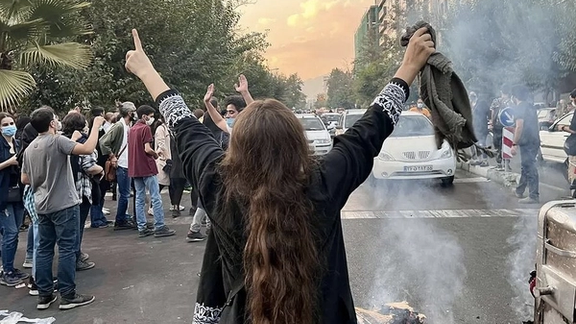
Germany and eight other EU member states plan to impose a new set of sanctions on individuals and organizations helping the Islamic Republic in its crackdown on dissent.

Germany and eight other EU member states plan to impose a new set of sanctions on individuals and organizations helping the Islamic Republic in its crackdown on dissent.
Accordingto a reportby German magazine Der Spiegel on Saturday, a package containing 31 proposals was introduced in Brussels on November 2, targeting individuals and institutions in the security sector as well as companies responsible for suppression of the current wave of protests, ignited by the death in custody of 22-year-old Mahsa Amini.
Measures include the freezing of assets and travel bans, the magazine said without disclosing its sources, adding that the new punitive measures have a good chance of being approved by EU foreign ministers at their upcoming meeting slated for November 14.
Ties between the Islamic Republic and the West are increasingly strained with Germany being among the first that started evacuating the families of the personnel of its embassy in Tehran and the teachers of German-run schools.
Germany's government on Thursday urged its citizens to leave the country or risk arbitrary arrest and long prison terms there.
Late in October, German Foreign Minister Annalena Baerbock said that her country and the European Union were examining whether to classify Iran’s Revolutionary Guard as a terrorist organization for its use of violence in the protests.
In mid-October, the EU sanctioned eleven Iranian individuals and four organizations for their role in the death of Mahsa Amini and the crackdown on the ongoing protests. These are the first and so far only EU sanctions over the ongoing protests.
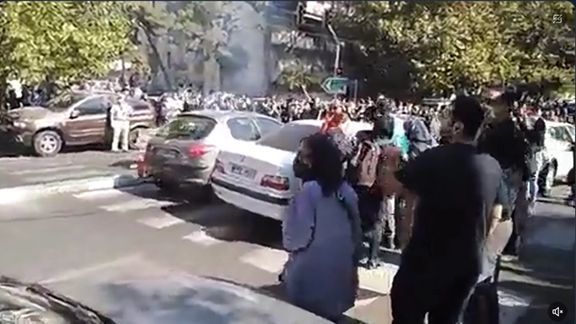
Several senior members of the Iranian American Medical Association have announced their resignation over the IAMA's refusal to support antigovernment protests.
In a letter obtained by Iran International, the group criticized the IAMA’s Board of Trustees and the Board of Directors for their lack of action in support of the Iranian protesters, on the pretext that the IAMA must remain 'apolitical'. The five signatories all are past or former officers of IAMA’s leadership.
The doctors argued that “defending basic human rights, social justice or public health issues are not political matters,” announcing their decision to disassociate themselves from the “dominating leadership” of IAMA.
"In recent turmoil in Iran where people are fighting for their basic human rights, and our medical and dentist colleagues in Iran are shot at, injured, detained and a few, so far, have lost their lives, we need to show our solidarity as a medical community," read the letter.
They said the Association should never be “silent or indifferent” in the face of the Islamic Republic’s human rights violations, particularly pertaining to public health, adding that there is “a strong resistance from a fraction of the Board members, particularly, from the founder” for taking any action. They said the members want to support their fellow physicians in their basic rights to protest in Iran but “the same fraction preferred to look another way.”
“We will start a new Medical and Dental organization, which, beside the scientific activities, humanitarian tasks, it can also give us the freedom and space to stand for human rights activities and social justice anywhere in the world, including the US and Iran, without fear of stigma,” they said, welcoming all healthcare professionals who share their visions to join them. “We must stay united and focus on the issues that our birthland is suffering from right now.”

Referring to the ongoing crackdown on the uprising, ignited by the death in custody of 22-year-old Mahsa Amini, they said “our birthland Iran, needs us, the brave people of Iran need us, the physicians and dentists in Iran need us, so, we must do something and will do our best to help them, to raise their voices inside and outside Iran and show our solidarity with them.”
The association has some apparent links to the clerical regime, as was revealed by a meeting of its former head Dr. Shervin Mortazavi with President Ebrahim Raisi during his visit to New York City.
Late in September, the IAMA issued a statement saying that the association will no longer be silent in the face of appeasement of and association with “this evil regime,” announcing the firing of Dr. Mortazavi.
“We, as IAMA members, like other Iranians all over the world, strongly condemn what has happened to Masa Amini, a young innocent girl as a distinct violation of human rights,” it said at the time.
There are more than 10,000 medical doctors of Iranian origin in the United States.
During a protest rally of doctors in Tehran late in October, at least one surgeon -- Doctor Parisa Bahmani -- was shot in the head and killed by security forces. She was killed during the gathering of doctors in front of Tehran Medical Council, after government forces opened fire on demonstrators.
Later in the month, a group of 130 neurosurgeons called on the Islamic Republic to stop violent crackdown on protesters, especially on “children and teenagers.”
Up to now, the Islamic Republic has not taken responsibility even for a single death during the demonstrations. Iran’s government either says victims died when they fell off the roofs, committed suicide, had some background disease, or lost their lives in car crashes.
The regime has killed over 304 people, including 41 children and 24 women, during the protests since mid-September. The Oslo-based Human Rights Organization said Saturday that the number of yet-to-be-verified reports of casualties is much more than this.

Iranians living abroad in solidarity with protesters in Iran once again held antigovernment demonstrations in major world cities.
On Saturday, the diaspora in the United States, Canada, Italy, Germany, France, UK, Australia, and several other countries staged rallies against the Islamic Republic.
In Los Angeles, Iranian expatriates rallied at Beverly Hills City Hall while famous artists and personalities such as Dariush Eqbali, Nazanin Bonyadi, Shohreh Aghdashlo and several political activists gave speeches. Similar rallies were staged in New York and Washington DC.
In the Canadian cities of Vancouver and Toronto thousands expressed solidarity with the uprising of Iranians and called for the release of rapper Toomaj Salehi and other political prisoners.
Toomaj Salehi is an Iranian hip hop artist mostly known for his protest songs about Iran's social issues and injustice by the government. Salehi was arrested on October 30th as part of the crackdown on opponents.
In Sydney, Australia, Iranians gathered in Hyde Park demanding an end to the government of the Islamic Republic. Famous Iranian singer Googoosh joined the crowd saying “Today no Iranian is afraid of this regime and will not forget the massacre of brothers and sisters.”
Similar protests were also held in Vienna, Aukland, Perth, Cologne, Hamburg, Stockholm, Gothenburg, London, Copenhagen, Rome, Bern and Paris.
Demonstrations in support of the protest movement of Iran have been held in more than 150 cities around the world up to now.
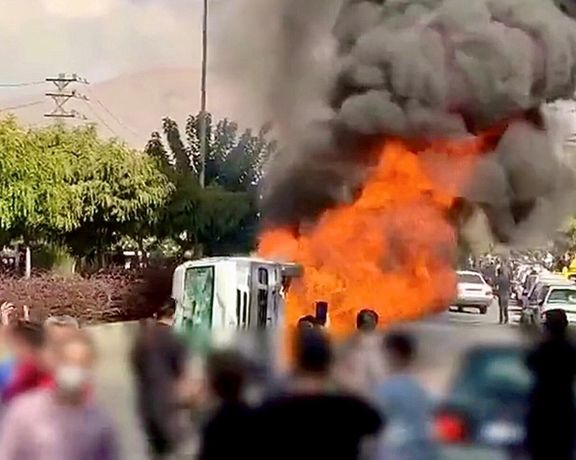
Some of Iran's relatively moderate political figures seem to be advising the government to find ways to end political deadlock and the dangerous popular uprising.
Nationwide protests have continued for seven weeks and have escalated in recent days as security forces have killed more people and the opposition in the streets has become more determined to overthrow the Islamic Republic’s clerical-military regime.
Former Majles speaker, now a senior adviser to Supreme Leader Ali Khamenei has said that "the government in Tehran badly needs to listen to the other side." Larijani advised the government to consider the fact that "Perhaps the other side is also partly right."
Nonetheless, while the statement signals a sign of rationality, Larijani's next comment shows that like Khamenei he also believes that "enemies" are behind the uprising: "The enemy has targeted Iran as a whole," he said.
Larijani charged, "In a neighboring country, the Americans are openly telling Iran's counter-revolutionaries to be active and exert pressure on Tehran." However, he did not name that country. It is also possible that Larijani is repeating Khamenei’s conspiracy theories as a shield for himself, not to be labelled disloyal by the Supreme Leader’s hardliner supporters.
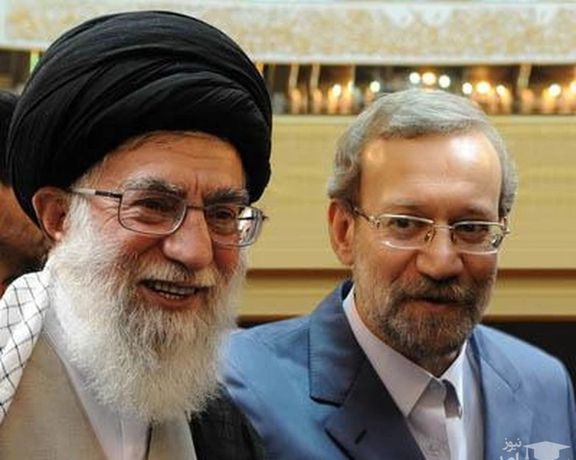
Referring implicitly to some rude slogans chanted by Iranian protesters against Khamenei, Larijani said: Some of the things we have done in the area of politics has left an impact on our social behavior. He was probably referring to badmouthing, vile accusations, arrogance and unilateralism that have become part of the usual practice among Iran's conservatives.
In another development, former Vice President Massoumeh Ebtekar, also known as Niloofar, one of the "students" that occupied the US embassy in Tehran in 1979 and held 54 US diplomats hostage for 444 days and is known to former US hostages in Iran as Sister Mary, offered her ways out of the current deadlock in a tweet on November 3: "The best way to end this cycle of violence is to stop arresting protesters, listening to their demands, acknowledging that there are problems in the society, restoring justice, respecting Iranian men and women's freedom, making the government accountable, holding effective dialogues with the people, furthering all-encompassing reforms, restoring the people's trust in the government and seeking their political participation in determining their own fate."
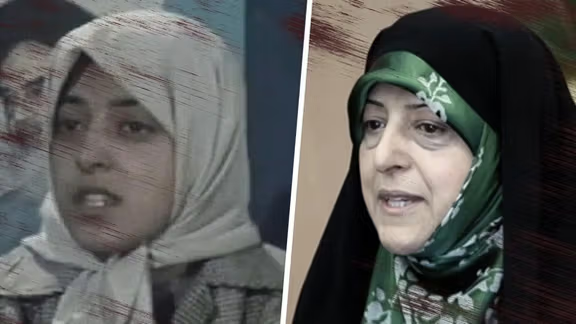
That is a pretty tall order that Iran’s reformists have pursued for a quarter of a century, only to see more repression and bad governance.
Ebtekar who seems to have been moved by the violence Iranians witnessed during the protests on November 2, particularly in Karaj near Tehran where at least two security officers were reportedly killed and many others wounded, advised the government to take measures sooner rather than later, because "It will be too late. Seize the opportunity while it lasts," she wrote.
On the contrary, referring to the same violent events, ultraconservative lawmaker Ahmad Naderi wrote in a November 3 tweet: "What happened in Karaj was not a protest. It was a security crisis. The level of confrontation by the security forces should be proportional to the protests, riots, mutiny, and terror. There is no room for appeasement."
Hossein Shariatmadari, the editor of Kayhan daily, which operates under the supervision of Ali Khamenei, Friday also called for harsher crackdown on dissent.
Reformist analyst Mohammad Reza Tajik has opined on Saturday that "The uprising by the Iranian people marks the violent return of a suppressed right to protest, as if we are facing a revolt for restoring the activism right that was in chains for a long time."
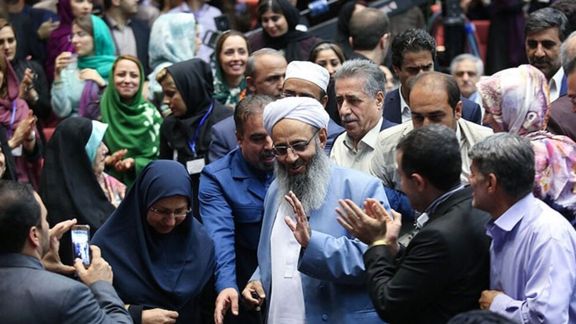
A leading Sunni cleric's popularity has been on the rise in Iran even among the Shiite majority since the start of nationwide protests in mid-September.
The rise in Molavi Abdolhamid's popularity is largely because of his brave comments that challenge the absolute authority of Supreme Leader Ali Khamenei.
In his Friday prayers sermons November 4, Molavi Abdolhamid, officially known as Molavi Shaikh Abdolhamdid Esmailzehi, once again called for a referendum in Iran to decide the form of government and political structure. He has done that before. But this time, he wants "an internationally monitored referendum," a characterization that revealed his distrust of the government and rejection of the Shiite clerical rule based on the absolute power of an unelected Supreme Leader.
Although Abdolhamid has been always vocal in upholding the rights of Sunni Iranians, his tone and rhetoric grew increasingly defiant after two rounds of IRGC attacks on Friday prayer crowds in his hometown of Zahedan since September 30. The attacks left more than 100 dead and many more wounded.
Addressing the government, he said on Friday, "A majority of Iranians are unhappy. If you don't agree, hold a referendum with the presence of international observers and accept the result.” He added: “By killing, beating, and arresting, you cannot push back a nation that has been protesting in the streets for 50 days now.”
Last week, a video of him after the second attack went viral on social media. In an extremely emotional and impressive sermon, he said with his chesty voice on 28 October, "The Sunnis have been suffering from discrimination since the start of the Islamic revolution in 1979." He warned the government that "Unilateral decisions are a weakness in the country’s administration."
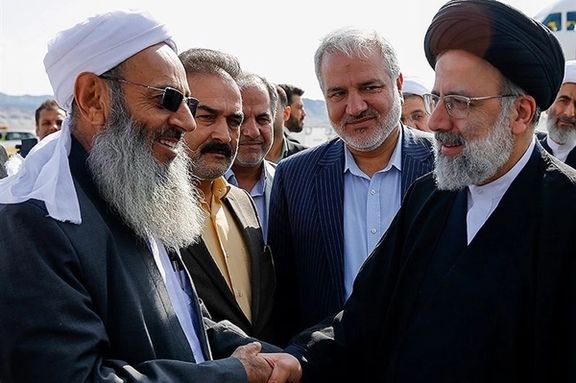
Fars news agency affiliated with the Revolutionary Guard accused the Sunni leader of encouraging people to revolt on November 5.
Molavi Abdolhamid who had previously supported Reformist President Mohammad Khatami (1997-2005) and moderate conservative Hassan Rouhani (2013-2021), encouraged Iran's Sunni population to support ultraconservative Ebrahim Raisi in the 2021 presidential election. Later he complained that Raisi had refused to fulfil his promises to the country's Sunni community while millions had voted for him. Following the attacks on preachers in Zahedan, some criticized Abdolhamid for having supported Raisi.
However, Abdolhamid was brave enough to hold Khamenei accountable for the attack. Subsequently, some Iranian media began to speculate about the possibility of Molavi Abdolhaid playing a major part in bringing about political change. Abdolhamid, 75, is generally known as one of the most influential political and religious leaders in Iran as nearly 15 million Sunnis listen to him. Their participation in the 2021 election is an indication of his tremendous influence.
In the early history of the Islamic Republic, Molavi Abdolhamid and other Sunni clerics opposed one of the articles of the Constitutional that allowed only Shiites to become president. At the start of the reform movement in 1997, Abdolhamid played a key part as a charismatic leader who rallied the Sunnis behind reformist politician Mohammad Khatami. The history of the Islamic Republic reveals that any candidate who had Abdolhamid's support won the election in Sistan and Baluchistan and Kurdistan Provinces.
Nonetheless, an Interior ministry official characterized Abdolhamid's October 28 sermons as provocative and charged that his words encouraged thousands of Baluch to take to the streets against the government. Thanks to his influence several senior security officers were replaced from their posts after the second attack on Zahedan.
Abdolhamid is respected by Iran's women's movement although women do not agree with his ideas in support of polygamy. Regardless, according to Rouydad24 website in Tehran, many in Baluchistan reportedly refer to Abdolhamid as Amir Al-Momenin [the leader of the pious], a rank that is indicative of his possibly greater role in the future of the region.
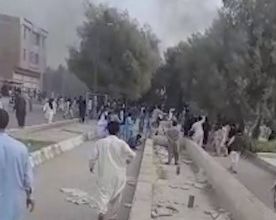
The anonymous group calling itself Tehran Youths has once again issued a call for protests in different neighborhoods of the capital and other cities.
Stressing that they will remain in the streets “until the overthrow of the Islamic Republic,” the group asked people to surge to streets Sunday afternoon in memory of Nima Nouri, a teenager from Karaj, who was killed by the direct fire of regime forces and the innocent people who were killed by “Khamenei’s shameless executioners" in the southeastern city of Khash November 4.
The mobility of protesters and their distribution in various neighborhoods, however, has now turned into a big problem for the security forces who are seen in some videos aimlessly running around to confront protesters and exhausting themselves even more after long hours of deployment.
Meanwhile, in the seventh week of the uprising against the Islamic Republic, protesters in Sanandaj in the northwest turned a funeral procession into a protest scene on Saturday.
The merchants and businessmen in Kordestan province closed their shops Saturday in solidarity with those killed Friday in Sistan and Baluchistan in the southeast.
University students, who have turned protests into a routine during weekdays, also held gatherings, sit-ins chanting antigovernment slogans across the country.
In the meantime, the death toll from the Islamic Republic's crackdown on Iran's 2022 protests has increased to 304, including 41 children and 24 women.
The Oslo-based Human Rights Organization said Saturday that the number of yet-to-be-verified reports of casualties is much more than this.